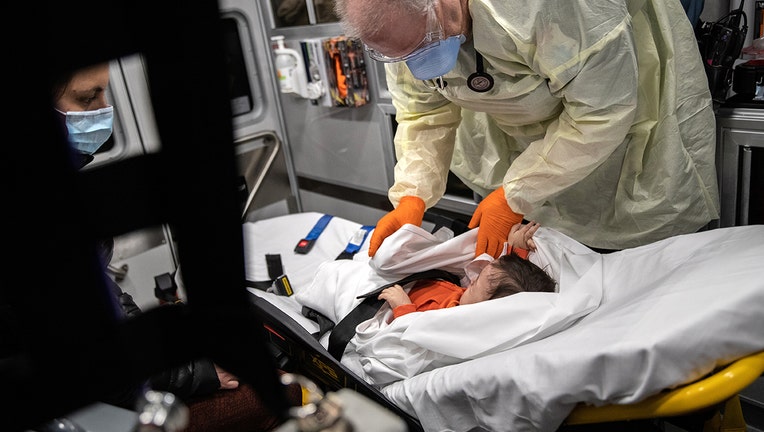US sees 28% increase in COVID-19 cases among children in just 2 weeks, report finds

Paramedic wearing personal protection equipment (PPE), tends to a 10-month-old boy with fever while riding by ambulance with the infant's mother to a hospital on April 04, 2020 in Stamford, Connecticut.
LOS ANGELES - The United States saw a 28% increase in COVID-19 cases among children across a two-week period, as coronavirus cases surge and reach record levels during the holiday season, a new report found.
According to the report from the American Academy of Pediatrics and the Children’s Hospital Association, 1.2 million children had tested positive for COVID-19 since the onset of the pandemic, as of Nov. 19.
But the number of new child COVID-19 cases reported over the past week alone is staggering, with more than 144,000 new cases in children — the highest weekly increase since the pandemic began.
In the one-week period ending Nov. 12th, there were 111,946 new cases in children, which is substantially more than any previous week in the pandemic, according to the report.
Meanwhile, over a two-week period, Nov. 5 to Nov. 19, there was a 28% increase in child COVID-19 cases (927,518 to 1,183,609).
“As a pediatrician who has practiced medicine for over three decades, I find this number staggering and tragic. We haven’t seen a virus flash through our communities in this way since before we had vaccines for measles and polio,” said AAP President Sally Goza in a statement. “And while we wait for a vaccine to be tested and licensed to protect children from the virus that causes COVID-19, we must do more now to protect everyone in our communities. This is even more important as we approach winter, when people will naturally spend more time indoors where it is easier for the virus to be transmitted.”
The AAP believes the number of reported COVID-19 cases in children is likely an undercount because children’s symptoms are often mild and they may not be tested.
Meanwhile, the report found that the virus has had a disproportionate impact on Black and Hispanic children, who are suffering a higher number of infections.
RELATED: Santa's mailbag gives a peek into children's pandemic worries
The AAP called on elected leaders to immediately enact a new national strategy to reduce the spread of the virus and address myriad harms resulting from the pandemic.
"We urgently need a new, nation-wide strategy to control the pandemic, and that should include implementing proven public health measures like mask wearing and physical distancing,” Goza said. “This pandemic is taking a heavy toll on children, families and communities, as well as on physicians and other front-line medical teams. We must work now to restore confidence in our public health and scientific agencies, create fiscal relief for families and pediatricians alike, and support the systems that support children and families such as our schools, mental health care, and nutrition assistance.”
As COVID-19 cases spike across states in the U.S., more and more schools and shutting down classrooms and going back to remote learning in an effort to curb the spread of the coronavirus.
While severe illness due to COVID-19 remains relatively rare in children, the AAP urges health authorities to do more to collect data on longer-term impacts on children. The AAP also called for more research into the emotional and mental health effects the pandemic is having on children.
RELATED: 6-year-old boy rings bell at Children's Hospital LA to mark last treatment
Children were 1.2%-3.1% of total reported hospitalizations, and between 0.2%-5.6% of all child COVID-19 cases resulted in hospitalization among 24 states and New York City, according to the AAC.
“We know from research on the impact of natural disasters on the mental health of children that prolonged exposure to this kind of toxic stress is damaging,” Dr. Goza said. “Most natural disasters have an end, but this pandemic has gone on for over eight months, and is likely to continue to disrupt our lives for many more. We’re very concerned about how this will impact all children, including toddlers who are missing key educational opportunities, as well as adolescents who may be at higher risk for anxiety and depression.”
More than 12.9 million coronavirus cases had been reported in the U.S., while over 264,000 deaths had been blamed on the virus, data compiled Nov. 27 by Johns Hopkins University showed.
The U.S. leads the world in the number of confirmed infections, as the country continues to see a record number of new daily cases, hospitalizations and deaths. Confirmed COVID-19 cases around the world topped 60 million on Wednesday.

